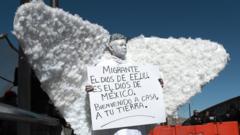Jean-Marie Le Pen, the man who shaped France's far-right landscape and was infamous for his extreme views, has passed away at 96. His death has prompted reflections on his polarizing influence on French politics, culminating in his daughter Marine Le Pen taking over and attempting to rebrand their party amidst a backdrop of familial strife and political transformation.
Jean-Marie Le Pen, Founding Father of French Far-Right, Passes Away at 96

Jean-Marie Le Pen, Founding Father of French Far-Right, Passes Away at 96
Jean-Marie Le Pen, the notorious figure behind France's far-right movement, has died at the age of 96, leaving behind a legacy marked by division and controversy.
In the wake of his departure, the political arena remembers Le Pen as a figure whose rhetoric on immigration and national identity not only sparked outrage but also found a significant following in the country. Born on June 20, 1928, in Brittany, he made headlines for both his controversial statements and political tenacity, emerging as a major force in the national discourse. His establishment of the National Front (FN) in 1972 led to a slow, yet impactful, presence in French politics, culminating in a shocking second-place finish in the 2002 presidential election.
Despite numerous legal troubles and accusations of extremism, Le Pen's legacy as the "Devil of the Republic" is undeniable. While his daughter's leadership aimed to distance the party from his overt radicalism, the rift between them remains a critical chapter in the history of the FN, which has since been rebranded as National Rally. His death marks the end of an era in French far-right politics, leaving a complex and contentious legacy behind.
Le Pen rejected attempts to distance himself from his past, instead forging a contentious path through French politics, culminating in a familial split that highlighted the ongoing struggle over the direction of the far-right in France. His passing raises questions about the future of the political landscape he helped to craft and the perennial debates surrounding his views.
Despite numerous legal troubles and accusations of extremism, Le Pen's legacy as the "Devil of the Republic" is undeniable. While his daughter's leadership aimed to distance the party from his overt radicalism, the rift between them remains a critical chapter in the history of the FN, which has since been rebranded as National Rally. His death marks the end of an era in French far-right politics, leaving a complex and contentious legacy behind.
Le Pen rejected attempts to distance himself from his past, instead forging a contentious path through French politics, culminating in a familial split that highlighted the ongoing struggle over the direction of the far-right in France. His passing raises questions about the future of the political landscape he helped to craft and the perennial debates surrounding his views.






















